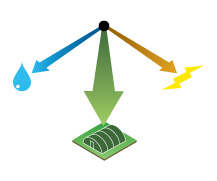Local Food Get Involved
What local governments can do
The Chicago Metropolitan Agency for Planning (CMAP) elevated Local Food to one of twelve regional priorities in the GO TO 2040 comprehensive regional plan, and a number of counties and municipalities are beginning to prioritize and pursue local food polices. Challenges remain, however, and there is a significant role for counties and other local governments to provide support by addressing regulations, land access, facilities, coordination, and supportive market conditions. Actions local governments can take to strengthen local food systems include:

Provide access to land, facilities, and infrastructure
to give farmers, distributors, and food entrepreneurs a chance to become established.
- Enter into farming leases for food production on publicly owned agricultural lands.
- Support the development of facilities for storage, processing, and packing through financing or donating county resources.
- Support business incubation centers or clusters of mutually beneficial activity, such as the co-location of farms, processing, and distribution facilities.

Adopt or modify policies and standards
to encourage local food operations and to reduce the cost and uncertainty of projects.
- Expedite permitting for activities that support the local food system such as farm stands.
- Create or modify zoning, land use, and public health regulations.
- Offer financing tools such as guarantees, revolving loans, and tax rebates to support local businesses.
Encourage the market, innovation, businesses, and entrepreneurs.

- Adopt local food procurement targets for public institutions such as school districts and hospitals.
- Support workforce development efforts at community colleges and elsewhere.
- Link hunger assistance programs to local food producers via LINK and food pantries.
- Include local food systems in economic development plans.
Support and participate in a forum to discuss and address local food system issues.

Such forums can:
- Coordinate policy initiatives, research, education, programs, and events.
- Support governments and businesses.
- Connect stakeholders, buyers, and sellers.